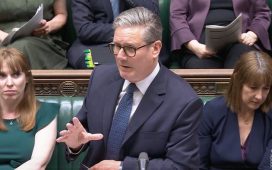Millions of households will pay lower gas and electricity bills this summer as the energy price cap for Great Britain falls by £122 a year to the equivalent of £1,568 for the typical annual charge from today.
However, the latest cap applies only from July until the end of September, and bills are expected to rise again this winter, leaving millions struggling to heat their homes.
Monday’s adjustment reflects lower costs in the wholesale gas and electricity markets – but bills are still more than £500 a year higher than they were before Russia’s war on Ukraine upended global energy prices.
National Energy Action (NEA) has estimated that about 5.6 million households in Great Britain will remain in fuel poverty over the summer, even with lower prices.
Adam Scorer, NEA’s chief executive, said: “Any drop in energy bills is welcome, but modest falls in summer look set to be wiped out by bigger rises in autumn when people will need to put the heating back on.”
The energy price cap is expected to rise by 10% to £1,723 a year from October, according to analysts at the energy consultancy Cornwall Insight, as wholesale markets have climbed higher. It expects bills to remain at a similar level into the first months of 2025.
Analysts at the Energy and Climate Intelligence Unit (ECIU), a thinktank, have warned that energy prices are likely to remain significantly higher than they were before the Russian invasion for the rest of the decade.
The conflict has ended Europe’s gas pipeline imports from Russia, which was once its largest source of gas. This has left European markets more exposed to global energy price fluctuations as it relies more on imports from the US and the Middle East.
Europe’s gas market prices were lower in the early months of the year after a relatively mild winter, allowing energy bills to fall this summer. But markets have started to climb again, in part due to stronger gas demand from Asian economies, which will spell higher bills again this winter.
Simon Cran-McGreehin, the head of analysis at the ECIU, said: “The UK’s high dependence on gas for electricity generation and heating has cost bill payers £2,000 so far during the gas crisis, and the economy as a whole tens of billions of pounds.”
after newsletter promotion
“Commonsense measures like investing in insulating the poorest homes, switching to electric heat pumps and fast-tracking British renewables will leave us less vulnerable to the whims of the international gas markets,” he said.
The consumer group Which? has urged households to take a meter reading as close to 30 June as possible “to ensure you don’t pay over the odds for any energy used after the new price cap takes effect”.
Scorer said: “Whoever is in power on 5 July inherits a fuel poverty crisis that causes misery, despair, ill-health and early death. A new government will need a new plan. Social tariffs to make energy affordable. ‘Help to repay’ programmes to reduce the debt burden. Energy efficiency schemes to build fuel poverty out of the homes of the most vulnerable.”










